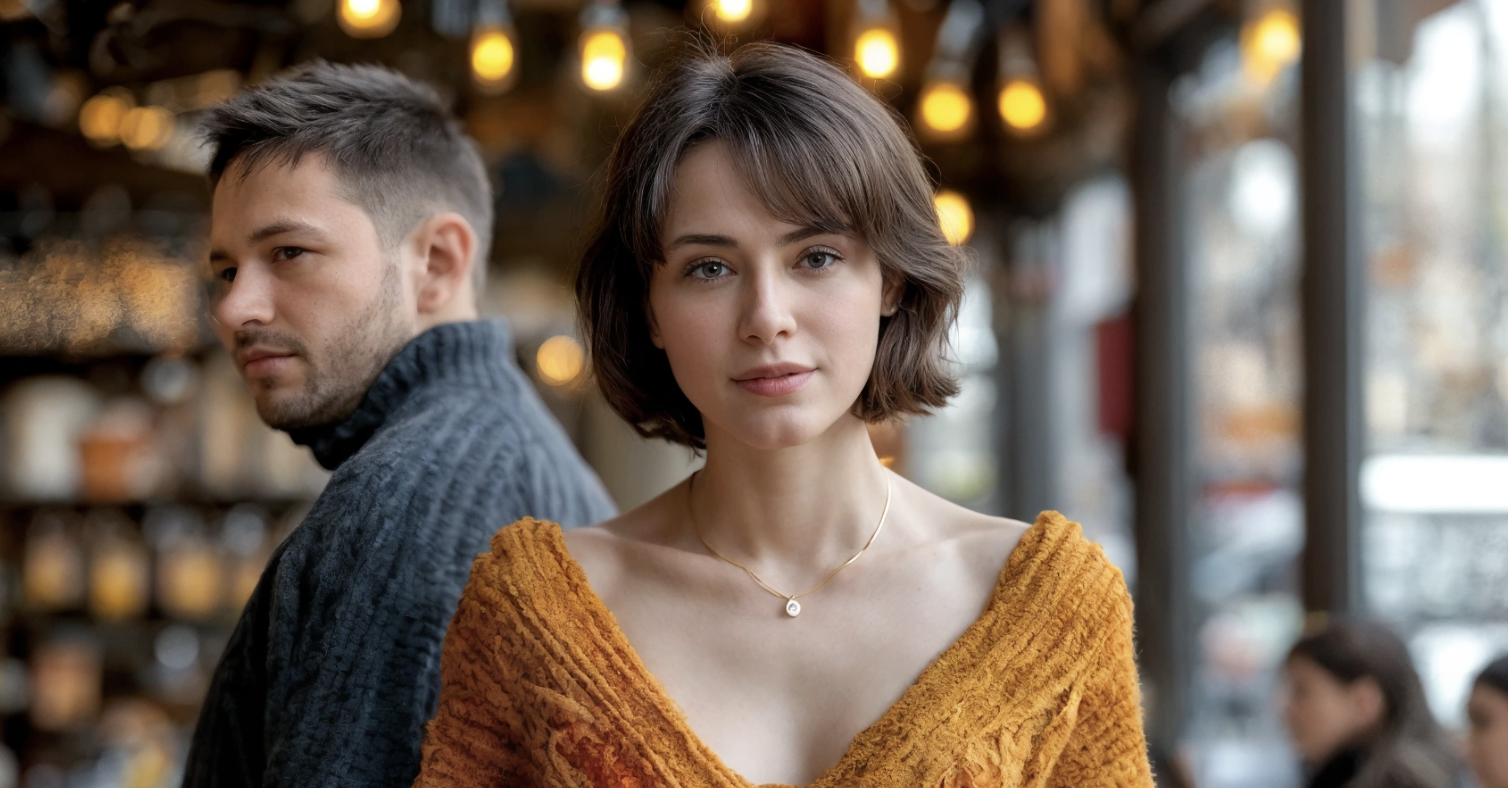I didn’t really want to get married a second time. The first experience—five years of emotional rollercoaster—ended in the usual way: mutual boiling irritation. We broke up but remained friends. We even texted occasionally—about work, the weather, and former mutual acquaintances.
With Anton, everything was different from the start. No butterflies, no fireworks, no sweet fainting spells. Just a sudden feeling of comfort and quiet, as if I had come home after a long journey. This short, broad-shouldered man with attentive gray eyes and a gentle smile simply appeared in my life—and stayed.
That evening, we were meeting with friends at a new restaurant on Marata Street. I was late after a meeting, rushed into the hall, crumpling my scarf, and while walking, scanned the tables looking for my friends. Anton was sitting alone in a corner, with a book and a glass of wine.
“A professor or something,” I thought. Our eyes met, he slightly nodded and went back to reading.
When I finally found my friends, it turned out Mashka had brought a new colleague. “By the way, he’s already here,” she smiled. “He’ll come over soon.”
And, of course, the “professor” came over. He put the book aside, but something professor-like remained in his gaze—attentive, studying. Anton Pavlovich, editor, divorced, daughter Polya, eight years old. I got all that information in the first five minutes of conversation. And not a word about the ex-wife—that I noticed immediately.
Two months later we moved in together. At the time, I had just received a promotion at the company and was working around the clock. My mother grumbled that a career wouldn’t bring happiness and urged me to think about children. But I always knew what I wanted. First financial independence, my own apartment, a good position at work—then everything else.
So, by the age of thirty-two, I had a two-room apartment in a new building, a department head position in a good company, and Anton. I agreed to this union with a clear understanding: he had a daughter from his first marriage, so I would have to share his attention and time.
I met Polya a month after we met. A thin, fair-haired girl with the same attentive look as her father. Somewhat like a porcelain figurine—touch her, and she’d break. She looked at me warily but politely. But I saw Anton’s ex-wife much later.
“Hello, Anton? Hi, it’s Svetlana,” the voice on the phone sounded beautiful and melodic. “I’ll be late today, can you pick up our daughter an hour earlier? Tell her I’ll drop by.”
I was standing nearby, making dinner. “I’ll drop by” sounded so natural, as if we were one big family, not ex-spouses and a new wife.
When Svetlana arrived, I realized two things. First, she was stunningly beautiful—a tall blonde with perfect facial features, like those drawn on glossy magazine covers. Second, she had no intention of even pretending that I existed here.
“Look what I brought you,” she handed Anton some folder, kissing him lightly on the cheek. “These documents for Polina need to be certified. And I enrolled her in art classes, hope you don’t mind?”
She spoke to him as if he was her personal secretary—and at the same time the closest person in the world. Not a single glance in my direction.
Anton behaved strangely. No, he didn’t flirt with his ex-wife, but he didn’t introduce me or set any boundaries. He just nodded, agreed, and asked about Polina’s progress in school.
“Tonia, you know how much she misses you,” Svetlana finally noticed me—more precisely, looked right through me. “Polina needs more time with her father.”
That was the first of many such scenes. Svetlana knew how to appear suddenly, always perfectly dressed, with new demands and requests for Anton. He never refused—neither money for Polina’s courses nor time needed for all that.
I kept silent. I understood: a child is sacred. But something about the situation was wrong, distorted. As if Anton remained Svetlana’s husband, and I was… what? An accessory to the apartment?
But I loved Polya. She was surprisingly serious and sensible for her age. We baked cookies together when she came on weekends, watched old cartoons. She showed me her drawings and quietly asked for advice on all sorts of girly things.
“My mom doesn’t let me paint my nails,” she whispered confidentially once. “She says I’m still too little. But I’m already nine.”
“Let’s do a special kids’ polish for you,” I offered. “You can just wash it off with water before you go home.”
We spent a whole hour choosing colors and painting little designs on each nail. When Anton returned from the store, Polya ran to him, showing off our handiwork.
“Beautiful,” he smiled, but somehow tensely. “Just don’t tell your mom, okay?”
I noticed anxiety in his eyes. Back then, I didn’t understand why he was so afraid of his ex-wife’s reaction.
I delayed meeting the mother-in-law as long as I could, but after six months of living together Anton insisted on a family dinner.
Nina Sergeyevna turned out to be a short, plump woman with attentive eyes and the same calm expression as her son. She studied me carefully while we drank tea in her spacious kitchen.
“Tonia told me you’re building a career,” she said instead of greeting me.
“I’m the head of department at StroiImpulse,” I answered proudly.
“That’s good that you’re independent,” the mother-in-law nodded. “But it seems you’re not thinking about children?”
Anton choked on his tea.
“Mom, let’s not…”
“What did I say?” Nina Sergeyevna asked sincerely surprised. “Polinochka is already nine, she could use a little brother or sister. Svetlana is such a good girl—works, raises the child, and takes her to classes.”
That was when I first felt a hot wave rising in my throat. Svetlana. Again, that Svetlana. Like the standard of everything right in the world.
“We’re not planning children yet,” I said as calmly as possible. “We have other priorities now.”
“Of course,” the mother-in-law nodded. “Career is more important. But the fact that my son needs a real family—that doesn’t matter.”
On the way home, I was silent. Anton looked at me guiltily.
“Don’t pay attention,” he finally said. “Mom is just worried about Polya. She’s afraid I won’t be able to give her enough time if we have another child.”
The logic of that statement escaped me, but I kept silent. Again. I started to keep quiet a lot in those months.
Work became my salvation. There I felt confident, my experience and knowledge were appreciated. After a particularly successful deal, I got a bonus and decided to update our apartment—buy a new sofa to replace the old sagging one, change the curtains, maybe re-paper the bedroom.
In the evening, we sat in the kitchen. I was drawing a rough expense plan, and Anton silently drank tea, occasionally glancing at his phone.
“What color sofa do you think I should choose?” I asked, handing him a catalog.
He shrugged:
“I don’t care. You pick.”
Anton seemed distracted, distant. Since we started living together, I noticed these mood swings more and more—from cheerful, attentive man to a silent, withdrawn shadow.
“Is something wrong?” I asked directly.
He shook his head:
“Just tired. Work’s piling up.”
The phone vibrated, and Anton grabbed it so hurriedly I involuntarily became alert. He quickly read the message, frowned, and put the phone face down.
“I need to meet a colleague early tomorrow,” he said. “So I’ll leave earlier.”
I nodded. And kept silent again, though my intuition was already screaming something was wrong.
Two weeks later, the mother-in-law called me herself. It was so unusual I was confused.
“Listen, I was at Polinochka’s yesterday,” she started without preamble. “Wanted to congratulate you on the new apartment. Svetlana is such a good girl, everything is so nicely arranged!”
I froze with the phone at my ear. What new apartment?
“Tonia told you?” the mother-in-law continued with a clearly malicious tone that took my breath away. “He bought Polinochka an apartment. A two-room on Komendantsky. So the child would have her own place in the future and somewhere to meet her father. So touching! Isn’t it?”
My head was spinning. An apartment? Where from? We lived in my two-room apartment, I paid for utilities and groceries, Anton had been practically freelancing for the last six months—he was laid off from the publishing house and was getting by on odd jobs.
“Nina Sergeyevna, Anton never told me about buying an apartment. You must be mistaken.”
“Oh,” the mother-in-law feigned surprise. “Really didn’t tell you? Well, he must have wanted it to be a surprise. Or… you know.”
I understood perfectly well. That “or” hung in the air like a poisonous fog.
All day I couldn’t focus on work. Questions swirled in my head. Where did Anton get money for the apartment? Why did he hide it from me? And most importantly—who was this apartment really for? For the daughter who visits twice a month? Or for the ex-wife?
In the evening, I put a furniture catalog I found in his bag in front of him.
“What’s this?” Anton asked, frowning.
“You tell me,” I answered calmly. “Your mother congratulated me today on buying an apartment for Polina. On Komendantsky.”
He turned so pale I was scared. Then jumped up, paced the room, clenching and unclenching his fists.
“God, why did she call you?” he finally exhaled.
“So it’s true?” My voice trembled.
Anton collapsed into a chair and covered his face with his hands.
“You see… it’s for Polya. For the future. So she’ll have her own place.”
“And when were you going to tell me? After the housewarming?” I tried to stay calm, but inside everything boiled. “Where did the money come from, Anton?”
He was silent, then looked up at me.
“Mom helped with the down payment. And also… a loan, I sold the dacha, and other little things…”
The room seemed to sway before my eyes. All the pieces of the puzzle finally fell into place.
“And who will pay off this loan?”
“I’ll help, of course,” Anton replied hastily. “And Sveta too. It’s for Polya.”
“For Polya…” I echoed. “And didn’t you think that this nine-year-old girl could live somehow without her own two-room apartment? That maybe healthy family relationships are more important? Why didn’t you discuss any of this with me?”
“I knew you’d be against it.”
That phrase was the last straw.
“Get out,” I said quietly. “Right now.”
The lawyer looked at me sympathetically, sorting through documents.
“So, your husband acquired property during the marriage, and it’s registered in his name?”
“Yes,” I nodded. “He already found money for the down payment, took out a loan. All this during our official marriage.”
“And do you have proof?”
I took out a flash drive:
“Bank statements, correspondence with the bank I found in his mail. And witness testimony—his mother will gladly confirm he bought the apartment.”
The lawyer smiled:
“Excellent. By law, property acquired during marriage is joint marital property. It doesn’t matter who it’s registered to. We’ll file a claim for property division.”
The trial lasted three months. Svetlana sat in the courtroom with a frozen face as the lawyer presented evidence. The mother-in-law hissed at me in the corridor: “What a nasty woman you are! You destroyed the family.” I just smiled in response: “Which one, Nina Sergeyevna? Mine or Svetlana’s?”
When the judge announced the decision—to recover half the apartment’s cost from the defendant in my favor, Anton went pale.
“That’s almost three million,” he whispered. “I don’t have that kind of money.”
“Then sell the apartment,” I shrugged. “Or take another loan. Your choice. It’s for Polina, remember? For the future.”
Walking out of the courtroom, I felt a strange lightness. Money wouldn’t return the time lost, but it would help start a new life. I cast one last glance at that strange trio—a pale Anton, crying Svetlana, and pursed-lipped mother-in-law.
All that glitters is not gold—that saying spun in my head all the way home. My quiet, calm Anton turned out not to be who I thought he was. His attentive gaze, gentle smile—it was all a mask. But now the mask was off, and I was finally free.
My phone vibrated in my pocket—a message from the lawyer: “Congratulations on your victory! To your health!” I smiled. Yes, definitely to my health and new life. Without Anton and his ex-family, which, it turned out, was never really “ex.”



